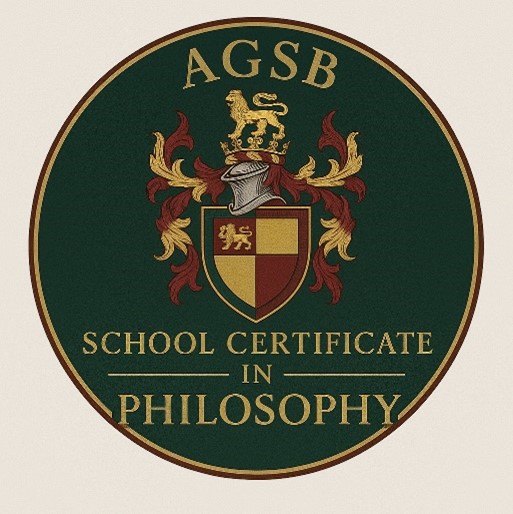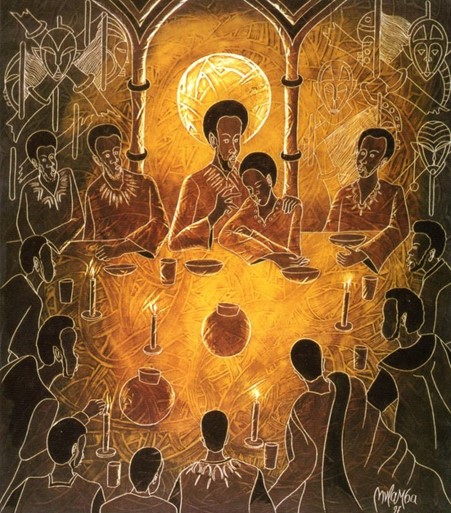KS4
Key Stage Four Curriculum Overview
The AGSB School Certificate in Philosophy
 Key Stage Four Introduction. At AGSB, the Key Stage Four Philosophy and Ethics course is a bespoke and academically rigorous programme designed to build on the strong foundations developed at Key Stage Three. This course cultivates critical thinking, intellectual curiosity, and a love of learning. Students are encouraged to think independently, engage with complex ideas, and develop clear, reasoned arguments.
Key Stage Four Introduction. At AGSB, the Key Stage Four Philosophy and Ethics course is a bespoke and academically rigorous programme designed to build on the strong foundations developed at Key Stage Three. This course cultivates critical thinking, intellectual curiosity, and a love of learning. Students are encouraged to think independently, engage with complex ideas, and develop clear, reasoned arguments.
The AGSB School Certificate in Philosophy offers a broad curriculum covering key areas such as Philosophy of mind, The ethics of artificial intelligence, Free-will and Determinism and the Philosophy of Art. In an age where digital technologies and instant access to information shape how we understand the world, students must learn not just to remember facts, but to analyse, evaluate and question them thoughtfully and rigorously. This course equips students with these vital skills.
Assessment is continuous and based on extended written work and philosophical investigations throughout the two years. The certificate, awarded at the end of Year 11, is signed by the Head of Philosophy and Ethics and the Headteacher, formally recognising students’ academic achievement and commitment.
Curriculum Overview:
- Year 10 introduces students to fundamental philosophical questions and thinkers, building on the broad topics explored in Key Stage Three. Students will delve into topics such as the ethics of Artificial Intelligence, Philosophical arguments for the existence of God and political philosophy. This year sets the groundwork for more specialised study in Year 11.
- Year 11 expands on these foundations, exploring advanced topics such as ethical theory, practical ethics and Philosophy of art.
Year 10
| Name of Topic | Key Content of the Topic | Assessment Points | |
|---|---|---|---|
|
HT1 |
Unit 1) An introduction to Philosophy |
|
End of unit assessment: |
| HT2 |
Unit 2) Philosophy of Mind |
|
End of unit assessment: ‘Exploring Philosophical Perspectives on Mind-Body Relations’ |
| HT3 |
Unit 3) Can machines think? |
|
End of unit assessment: |
|
HT4 |
Unit 4) Is there a God? |
|
End of unit assessment:‘Arguments for the existence of God independent study task’ |
| HT5 |
Unit 5) Freewill and determinism |
|
End of unit assessment: ‘Do we have freewill? Subject knowledge quiz’ |
| HT6 |
Unit 6) Do we need governments? |
|
End of unit assessment: ‘Anarchism independent study task’ |
Year 11
| Name of topic | Key Content of the Topic | Assessment points | |
|---|---|---|---|
|
HT1 |
Unit 1) Is it more important to be good than happy? |
|
End of unit assessment:‘Is it more important to be good than happy?’ |
|
HT2 |
Unit 2) Practical ethics - Part 1 |
|
End of unit assessment: ‘Should assisted suicide for the terminally ill be legalised? |
| HT3 |
Unit 2) Practical ethics - Part 2 |
|
End of unit assessment: ‘The death penalty has no place in the modern world discuss’ |
|
HT4 |
Unit 3) What is art? |
|
End of unit assessment: ‘Virtual gallery research activity’ |
|
HT5 |
Unit 4) Is there evidence for God |
|
End of unit assessment: 'Miracles cannot be verified. Discuss’ |
| HT6 | N/A | GCSE Exams | |
Support available for students
All students will be issued with personal learning checklist, subject knowledge/topic starter sheets and the necessary preparatory material for independent research tasks. All resources used in lessons are available in the departmental STU.
Students can attend the fortnightly Philosophy Society led by Mr Sampson in S4. This provides an invaluable opportunity for students to explore interesting Philosophical questions in an easily accessible way.
Students and parents can access the lesson materials used in Philosophy and Ethics via the Philosophy and Ethics STU (Student Shared Area). This is particularly useful for pupils who have missed lessons due to illness or for parents who would like to support their child’s learning at home.


Recommended Textbook for Philosophy and Ethics (KS4)
Resources are organised by year group:
The Collins Philosophy and Ethics Student Book by Robert Orme introduces a wide range of philosophical and religious ideas in an accessible format. It includes topics such as the nature of reality, arguments for and against the existence of God and questions about the self, knowledge, and belief - many of which are explored in our Key Stage 3 programme of study.
Although this textbook is not required, students and families may find it a helpful resource for reviewing lesson content or deepening understanding. It also provides an excellent foundation for the AGSB School Certificate in Philosophy, studied by all pupils in Years 10 and 11.
View the book on Amazon: https://www.amazon.co.uk/Philosophy-Ethics-KS3-Knowing-Religion/dp/0008355029
Recommended online Resources:
These websites, podcasts and video channels are recommended for students who wish to deepen their understanding of key philosophical, ethical and religious ideas explored in the curriculum.
Podcasts:
- In Our Time – Philosophy (BBC) - Expert-led discussions on key philosophical ideas and thinkers.
- The Panpsycast Philosophy Podcast - Student-friendly episodes exploring major philosophical questions
- Philosophy Bites - Short interviews with philosophers on classic and contemporary topics.
- History of Philosophy Without Any Gaps - A global and chronological journey through philosophical thought.
YouTube Channels:
- Closer to Truth – Big questions in science, philosophy, and religion
- Philosophy Vibe – Accessible, discussion-based philosophy topics
- Crash Course: Philosophy – Animated introductions to major concepts and thinkers
- TED Talks – Philosophy – Short expert talks on philosophical themes
- The Bible Project – Visual explorations of Biblical texts and themes
Websites:
- BBC Bitesize – Religious Studies (KS3 & KS4) – Curriculum-linked revision and topic summaries
- RE:Online – Subject Knowledge – Detailed overviews of world religions
- Stanford Encyclopedia of Philosophy – Authoritative articles on philosophical topics
- Oxplore (University of Oxford) – Big questions for curious minds aged 11–18
- Philosophy Now Magazine – Articles and interviews from contemporary philosophers
Students and parents can access the lesson materials used in Philosophy and Ethics via the Philosophy and Ethics STU (Student Shared Area). This is particularly useful for pupils who have missed lessons due to illness or for parents who would like to support their child’s learning at home.

